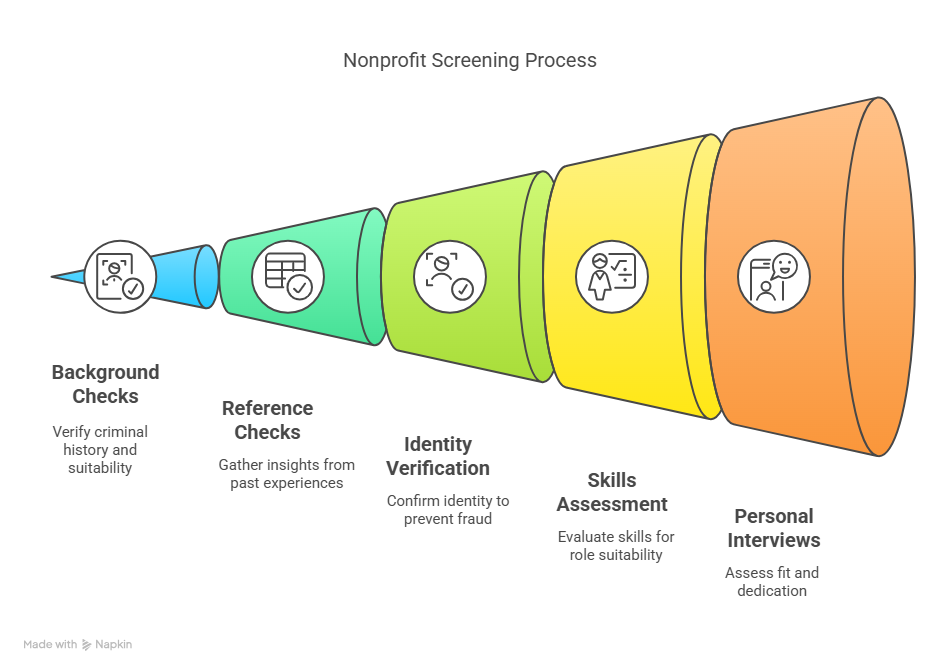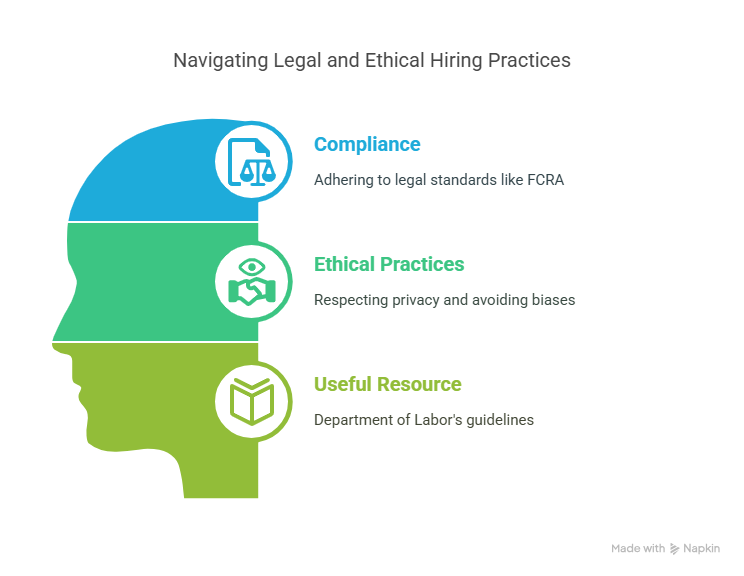When it comes to managing a nonprofit organization, ensuring the safety, security, and integrity of your operations is paramount. Nonprofit screening helps protect your organization, volunteers, and beneficiaries by thoroughly vetting individuals involved in your cause. This guide covers the best practices for nonprofit screening, ensuring your organization can operate efficiently and ethically.
Key Takeaways
- Effective screening is essential for safeguarding stakeholders, mitigating risks, and enhancing the credibility of nonprofit organizations.
- Nonprofit screenings include detailed checks for both volunteers and employees, ensuring those involved are reliable and trustworthy.
- Establishing role-specific screening criteria, developing a clear policy, and utilizing reliable screening services are critical steps for robust screening processes.
- Continuous monitoring and regular updates to screening policies are necessary to maintain organizational integrity and adapt to new legal and ethical standards.
- Addressing challenges like limited resources and high volunteer turnover with practical solutions ensures that nonprofits maintain thorough and consistent screening protocols.
Introduction
Nonprofit organizations play a pivotal role in addressing societal issues and supporting vulnerable communities. However, they also face unique challenges, particularly in ensuring the safety and integrity of their operations. This is where effective nonprofit screening comes into play, serving as a crucial step in protecting not just the organization but also its volunteers and beneficiaries.
In this guide, we'll break down the best practices for nonprofit screening, covering everything from the types of screenings to legal considerations and ongoing monitoring. Whether you're a business owner, HR professional, recruiter, or job seeker in the nonprofit sector, this comprehensive overview aims to arm you with the information you need to navigate the complexities of nonprofit screening.
By adhering to these guidelines, you can help create a safer, more trustworthy, and efficient environment for your nonprofit organization.

Why Nonprofit Screening is Essential
Safeguarding Stakeholders
First off, let's not sugarcoat it—your stakeholders are the lifeblood of your nonprofit. We're talking about beneficiaries, donors, employees, and volunteers, all of whom rely on the integrity and safety of your operations. Nonprofit screening acts as your first line of defense in protecting these parties. Thorough vetting ensures that those who interact with vulnerable populations, handle sensitive data, or manage funds are reliable and trustworthy. It's simple: the better the screening, the safer everyone is.
EXPERT INSIGHT: As an HR professional, I have seen in person just how important thorough screening is—not just for compliance, but to protect the integrity of our mission. The people we bring in to join us shape our culture, our safety, and our reputation for all we accomplish. I have had experiences where one background check prevented what could have been an absolute disaster, while others have resulted in a stellar screening process that brought in an incredibly valuable volunteer. Trust is an important part of nonprofit work—and that trust begins with the way we screen individuals to join our mission. Screening is not an impediment; it's an added protection for those we serve and for the impact we work to make every day. - Charm Paz, CHRP
Risk Mitigation
Nobody likes unpleasant surprises, especially when they come in the form of fraud, abuse, or other misconduct. With thorough screening, you can significantly reduce these risks. Imagine discovering post-hiring that an employee has a history of financial misconduct, or learning too late that a volunteer poses a risk to vulnerable clients. Background checks, reference checks, and other screening methods help nip these issues in the bud. By proactively addressing potential threats, you save your organization from future headaches and potential liabilities.
Enhancing Credibility
Now, let's talk reputation. For nonprofits, credibility is everything. It's what attracts donors, volunteers, and community support. Proper screening practices signal that your organization is serious about maintaining high standards. It's not just about looking good; it's about being a responsible entity that people can trust. When stakeholders know that you prioritize thorough vetting, they're more likely to feel secure in their association with your nonprofit. In the long run, this boosts your credibility and solidifies your reputation as a trustworthy organization. So, win-win.
Types of Nonprofit Screenings
Volunteer Checks
Screening volunteers is a vital step in ensuring that the individuals who interact with your organization's beneficiaries and represent your cause are trustworthy and reliable.
Importance
Volunteers often have direct contact with vulnerable populations, such as children, the elderly, or individuals with disabilities. Ensuring that these volunteers are thoroughly screened adds an extra layer of security for those you aim to protect. Beyond safety, a rigorous screening process shows donors and stakeholders your commitment to maintaining a responsible and ethical organization.
Scope
When it comes to the scope of volunteer checks, several elements are typically involved:
- Background Checks: A criminal background check is essential to identify any prior convictions that may make a person unsuitable for your organization.
- Reference Checks: Contacting previous volunteer organizations or employers can provide additional insights into a volunteer’s reliability and integrity.
- Identity Verification: Ensuring that the volunteer's identification documents are valid helps prevent identity fraud.
- Skills Assessment: Depending on the role, verifying a volunteer’s skills and qualifications can be beneficial, especially if they will be taking on specialized tasks.
Employee Screening
Screening employees in a nonprofit setting is just as crucial as in any other sector. Employees are often entrusted with sensitive information, financial resources, and responsibilities that can impact the organization's overall effectiveness.
Importance
Employees are the backbone of your nonprofit. They handle essential functions, from program implementation to donor relations. With trusted individuals in these positions, you mitigate the risks of fraud, financial misconduct, and operational failures. This level of scrutiny ensures that you are building a reliable team that aligns with your mission.
Methods
Several methods are employed in the screening process:
- Criminal Background Checks: Similar to volunteer screening, this step helps identify any past criminal activity that might pose a risk.
- Education Verification: Confirming the educational credentials of potential employees ensures they have the necessary background for their roles.
- Employment History: Checking past employment can help verify the candidate’s experience and uncover any potential red flags.
- Credit Checks: Though not always necessary, credit checks can be valuable, particularly for positions involving financial responsibilities.
- Personal Interviews: Face-to-face or virtual interviews can be effective for assessing an applicant’s fit within your team and their dedication to your cause.
By integrating both volunteer and employee screening processes, you create a sustainable and secure environment for all participants in your nonprofit organization. These steps not only protect your beneficiaries but also preserve the integrity and reputation of your mission.

Steps for Effective Nonprofit Screening
Define Screening Criteria
Establishing clear, role-specific screening criteria is crucial to ensure that the right individuals are selected for your organization. Each role within a nonprofit has its unique responsibilities and demands, and your screening criteria should reflect these specific needs.
- Role-Specific Requirements: Start by evaluating the responsibilities and risks associated with each position. For example, roles involving direct contact with vulnerable populations may require more stringent background checks compared to administrative positions. Define the specific checks needed for each role, such as criminal history, reference checks, and relevant certifications.
- Legal Guidelines: It's important to adhere to both federal and state regulations during your screening process. Compliance with laws like the Fair Credit Reporting Act (FCRA) ensures that your screening practices are non-discriminatory and respect the privacy of candidates. Review the legal requirements periodically to adjust your criteria accordingly.
Develop a Screening Policy
Having a well-documented screening policy lays a strong foundation for consistent and transparent practices within your nonprofit.
- Formal Documentation: Create a clear, detailed screening policy document that outlines your organization's specific screening procedures, criteria, and the rationale behind them. This document should be easily accessible to all stakeholders, including staff, volunteers, and board members.
- Transparency: Ensure that potential volunteers and employees are well-informed about the screening process. Transparently communicating what the screening entails and why it's necessary helps to build trust and manage expectations. Include information about how long the process will take and how the results will be used.
Utilize Reliable Screening Services
Selecting the right screening services can significantly impact the effectiveness and reliability of your screening efforts.
- Criteria for Selection: When choosing a screening service, prioritize attributes such as accuracy, confidentiality, and legal compliance. Look for providers with a strong track record in the nonprofit sector and the ability to conduct comprehensive checks. Check reviews and testimonials to gauge their reputation.
- Integration: Smooth integration of screening services into your onboarding process is essential for maintaining efficiency. Choose services that can seamlessly integrate with your existing HR systems. This minimizes delays and ensures that you can quickly move from screening to onboarding, without compromising on thoroughness.
By meticulously defining screening criteria, developing a robust screening policy, and utilizing reliable screening services, your nonprofit will be well-equipped to safeguard its operations and build a trustworthy, dedicated team.
Define Screening Criteria
Role-Specific Requirements
Defining screening criteria begins with understanding the specific needs and responsibilities of each role within your organization. This means breaking down the tasks, level of access to sensitive information, and the level of interaction with vulnerable populations. For a volunteer working in direct contact with children, a thorough criminal background check might be imperative. Meanwhile, a volunteer involved in administrative tasks might only need employment history and reference checks.
Legal Guidelines
Navigating federal and state regulations is key when defining your screening criteria. To avoid discriminatory practices, it's crucial to comply with legal guidelines such as the Fair Credit Reporting Act (FCRA) and Equal Employment Opportunity (EEO) laws. This ensures that you are not only adhering to the legal framework but also fostering a fair and inclusive screening process. By aligning your criteria with these regulations, you minimize the risk of legal repercussions and establish a transparent and equitable recruitment process.
Develop a Screening Policy
Creating a formal screening policy isn't just a nice to have—it’s essential for ensuring consistency, fairness, and legal compliance in your nonprofit's onboarding process. A well-documented policy helps eliminate confusion and sets clear expectations for everyone involved. Here's what you need to include:
- Formal Documentation: To start, put your screening policy in writing. This document should outline the procedures and criteria for screening both volunteers and employees. Having everything laid out in black and white minimizes misunderstandings and provides a reference point for resolving disputes.
- Transparency: Potential volunteers and employees should know exactly what to expect when they agree to be screened. Make your screening policy available publicly or at least easily accessible within your organization. Transparency fosters trust and ensures that candidates are aware of the steps involved, why they are necessary, and how long they might take.
By formalizing and communicating your screening policy, you’ll not only safeguard your organization but also build a foundation of trust and reliability that attracts committed, reputable individuals.
Utilize Reliable Screening Services
When it comes to choosing a screening service for your nonprofit, accuracy and reliability are non-negotiable. Start by evaluating the service provider’s track record. Check customer reviews and ask for references from organizations similar to yours. A reliable service will provide precise, up-to-date information and maintain high standards of confidentiality. Additionally, they should comply with all relevant legal guidelines, including federal and state regulations, to ensure a discrimination-free process.
Integration with your existing onboarding processes is another critical factor. The best screening services offer seamless integration options, reducing the administrative burden on your HR team. Look for features like user-friendly interfaces, customizable screening packages, and prompt customer support. By carefully selecting a reliable and efficient screening service, you can ensure your nonprofit remains secure and well-respected.
Legal and Ethical Considerations
Compliance
Adhering to legal standards like the Fair Credit Reporting Act (FCRA) is non-negotiable. The FCRA sets strict guidelines on how and when background checks can be conducted, ensuring that the process is transparent and fair. Additionally, you must comply with state-specific regulations, which can vary widely. Failing to stay within these legal boundaries can result in hefty fines and damage your organization's reputation.
Ethical Practices
Proper screening is not just about ticking boxes; it’s a commitment to ethical standards. Respect privacy by collecting only the information essential for the role. Avoid biases and discrimination by applying the same screening criteria to everyone. An ethical approach not only protects individual rights but also enhances your organization’s credibility and trustworthiness.
Useful Resource
For more guidance on legal hiring practices, refer to the Department of Labor's guidelines, which offer comprehensive insights on maintaining legal and ethical standards during the screening process.

Implementing a Continuous Screening Process
Ongoing Monitoring
You don't stop at the initial check. Continuous monitoring ensures that your volunteers and employees remain as trustworthy as the day they were hired. This means periodically rescreening individuals to catch any red flags that might arise after they've joined your organization. It's like regular health check-ups—crucial for maintaining overall well-being.
The benefits? First, you minimize risks. If someone gets involved in criminal activity post-hire, you'll know. Second, it helps in maintaining the integrity of your organization. Donors and stakeholders appreciate an organization that keeps its house in order.
Updating Policies
Screening policies shouldn’t be static. They need to evolve to meet new challenges and comply with updated regulations. Set a timeline for regular reviews—every six months to a year should do it. Gather feedback from those involved in the screening process and make adjustments based on what you learn.
New tech and legal requirements can also impact your policies. For example, as data protection laws become stricter, you'll need to ensure your screening process complies fully. Keeping your policies updated shows that you’re proactive, not reactive—always a good look for maintaining credibility and trust.
Challenges and Solutions in Nonprofit Screening
Nonprofit organizations often face unique challenges when it comes to screening volunteers and employees. Here’s a look at two of the most common hurdles and practical ways to overcome them.
Challenge 1: Limited Resources
Nonprofits typically operate on tight budgets, which can make allocating funds for thorough screening processes difficult. Despite these constraints, comprehensive screening is crucial to maintaining the safety and integrity of the organization.
Solutions:
- Prioritize Critical Roles: Focus your limited resources on screening individuals in positions that involve direct contact with vulnerable populations or access to sensitive information.
- Seek Grants: Look for grants or funding opportunities specifically aimed at helping nonprofits with operational costs. Some foundations and organizations offer grants for safety and screening initiatives.
- Leverage Partnerships: Form partnerships with screening service providers who may offer discounted rates for nonprofits. Additionally, collaborate with other nonprofits to share resources and reduce costs.
Challenge 2: Volunteer Turnover
High turnover rates among volunteers can complicate the screening process. Frequent onboarding can make it hard to maintain consistent and thorough checks, potentially leading to gaps in your safety protocols.
Solutions:
- Streamlined Screening Process: Develop a streamlined yet rigorous screening process that can be efficiently replicated, ensuring consistency despite high turnover.
- Retention Strategies: Invest in volunteer retention strategies to reduce turnover and ease the screening burden. This can include better training, recognition programs, and ensuring a positive volunteer experience.
- Digitize Records: Use digital tools to keep track of all screening records, making it easier to manage and retrieve information quickly as volunteers come and go.
By addressing these challenges head-on with practical solutions, nonprofits can maintain a robust screening process that ensures the safety and credibility of their operations, even with limited resources and high volunteer turnover.
Conclusion
Effective nonprofit screening is not just a bureaucracy but a cornerstone of operational integrity and trust. By establishing clear criteria, developing robust policies, and utilizing reliable services, nonprofits can safeguard their stakeholders and bolster their credibility. Continuous screening and adherence to legal and ethical standards ensure that the organization remains up-to-date with the evolving landscape. While challenges like limited resources and high volunteer turnover are inevitable, they can be managed with strategic planning and creative solutions. Prioritizing screening processes isn't merely about risk management; it's about fostering a secure, respected, and successful nonprofit organization ready to make a lasting impact. Rooted in every nonprofit is a mission to serve—and protecting that mission starts with those who drive it. By investing in the right screening practices, we're investing in safer communities, more cohesive teams, and increased trust. Ultimately, an effectively screened organization is stronger one with the integrity to keep promises and to act with compassion.

